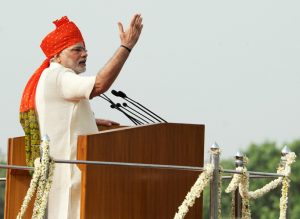The coronavirus pandemic has been a turning point for many populist-nationalist leaders around the world. The mishandling of the COVID-19 crisis arguably cost Donald Trump the U.S. presidency and precipitated a cabinet revolt against Brazil’s Jair Bolsonaro. The rulers of Hungary and Poland have been on the backfoot as the pandemic ravaged their countries. The only exception to this trend had been Narendra Modi, whose soaring popularity was sustained through a year of the pandemic. The second wave in India has undone all that.
Modi finds himself battling the most serious threat to his dominance over Indian politics in seven years. India’s healthcare infrastructure has collapsed under the devastation caused by the second wave. The national media has been awash with gruesome images of mass cremations and people dying outside hospitals, and social media is inundated with desperate pleas for oxygen cylinders. In fact, a large number of people have perished owing to a crippling shortage of medical oxygen.
For the first time, there is a widespread sense of anger against the central government. Modi’s populist politics has so far seen his party deliberately court the ire of particular groups of society: Muslims, intellectuals, left-leaning students, and farmer unions. These groups have been then framed as the prototypical “other” thwarting the progress of a “pure” national community. However, this time around, the focal point of the anger against Modi is emerging from his most loyal political base — the urban middle classes.
The television clips of the prime minister exulting in the size of his election rallies in West Bengal, as panic-stricken citizens struggled to find hospital beds for their loved ones, has unquestionably damaged the messianic image that lies at the core of Brand Modi. While the carefully cultivated messianic image of Modi portrays a selfless leader who doesn’t hanker after power, and whose political interest is co-terminus with national interest, the story coming out of West Bengal was that of a cynical leader privileging electoral success over the lives of his countrymen. Moreover, as Modi zealously made himself the face of the “successful fight” against the pandemic as the first wave receded, it is natural that Modi (and not his ministers and bureaucrats) is attracting the bulk of the blame for the devastation caused by the second wave.
However, it is still too early to definitively view this as a turning point against Modi. The opposition remains weak and divided, and less than two years into his second term, Modi has ample time to refurbish or reinvent his political brand, as he has done so many times before. The ultimate test of the political fallout of the pandemic will be the Uttar Pradesh elections, which is still nearly a year away.
The much-anticipated results of the recent elections for five state assemblies does not paint a clear picture of the future prospects for Modi or his Bharatiya Janata party. The pandemic didn’t play a crucial part in any of the elections, except perhaps to some extent reinforcing pro-incumbency sentiments in the states of Assam and Kerala. Despite the tremendous political capital invested in West Bengal by Modi and his party, they were roundly defeated by the ruling Trinamool Congress.
However, in neighboring Assam, Modi’s party became the first non-Congress government to ever return to power, comfortably rebuffing the challenge of the Congress party, which continues on its abysmal electoral slide. Further, BJP’s decline in vote-share in the state elections of Bengal, from the high of its national election level, was merely the latest iteration of a trend we have seen for the last many years. Therefore, it would be a mistake to treat West Bengal as a referendum on Modi’s popularity, even as we can safely state that there are limits to his vote pulling power in state elections. The two big southern states largely voted on expected lines. In Tamil Nadu, the opposition DMK convincingly defeated the ruling AIADMK, an ally of the BJP, while in Kerala, the ruling Left party registered a historical triumph in a state famous for throwing out incumbents.
Had Modi’s party won in Bengal, the political ramifications would have been huge. The BJP would have found an invaluable source of political legitimacy at a time Indian politics seems to be at a moment of churning. It would have been their first electoral victory in a state ruled by a regional party. Modi would have been able to reclaim some of the political narrative lost during the farmers protests and the pandemic, and the air of invincibility would have surrounded him again. As it stands, the West Bengal election was no respite for Modi. If anything, the voices of dissent would now be louder and his political opposition would have a spring in their stride. The second wave of the pandemic, reinforced by the state assembly results, has pushed Indian politics toward a crossroads. Modi’s hold on power does not seem unshakeable anymore.

































